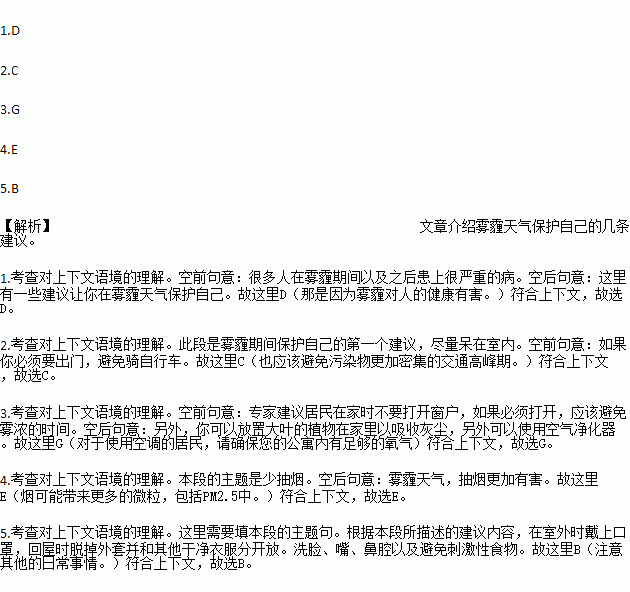题目内容
Do you still remember the haze(雾霾)in the winter? So many people got terribly ill during or after the haze. 1.Here is advice for you to protect yourself in hazy weather.
Spend less time outdoors.This is the most effective way for self-protection in such bad weather.With PM2.5 increasing 103mg per cubic meter,residents will risk a 2.29% increase of death,which experts found out in 2012.If you have to get out,avoid riding bicycles.2.
Close your windows.Experts advice residents to avoid opening windows at home.If you have to ,avoid the time when smog is at its densest(浓的).3.Besides,you can keep plants with broad leaves at home to absorb dust,and use air purifiers(清洁器).
Smoke less.4.In hazy weather,smoking would be even more harmful.Smokers are advised to keep their distance from cigarettes before the weather gets better.
5.For example ,wear special masks outside to avoid breathing in PM2.5.Then take off your coat after getting indoors and keep it away from your other clean clothes,Don’t forget to wash your face,rinse(漱)your mouth,and clean your nasal cavity(鼻腔)to clean the particulate matters(颗粒物)that fall on you.Last but not least,keep off stimulating(刺激性)foods.
A.Wear masks.
B.Pay attention to other daily things.
C.Also avoid rush hours,when pollutants will be denser.
D.That’s because haze does harm to the health of people.
E.Cigarettes could cause more particulate matters,which are included in PM2.5 .
F.Take more fruits and vegetables instead,which are good for lung,spleen(脾)and kidney(肾).
G.For residents who use air-conditioner,make sure your apartment has enough oxygen indoors.
 名校课堂系列答案
名校课堂系列答案

 had been bitten off my right arm. I felt a lot of warm, gushing blood.
had been bitten off my right arm. I felt a lot of warm, gushing blood. ything, you can fire me.”
ything, you can fire me.” o clean the place.
o clean the place.